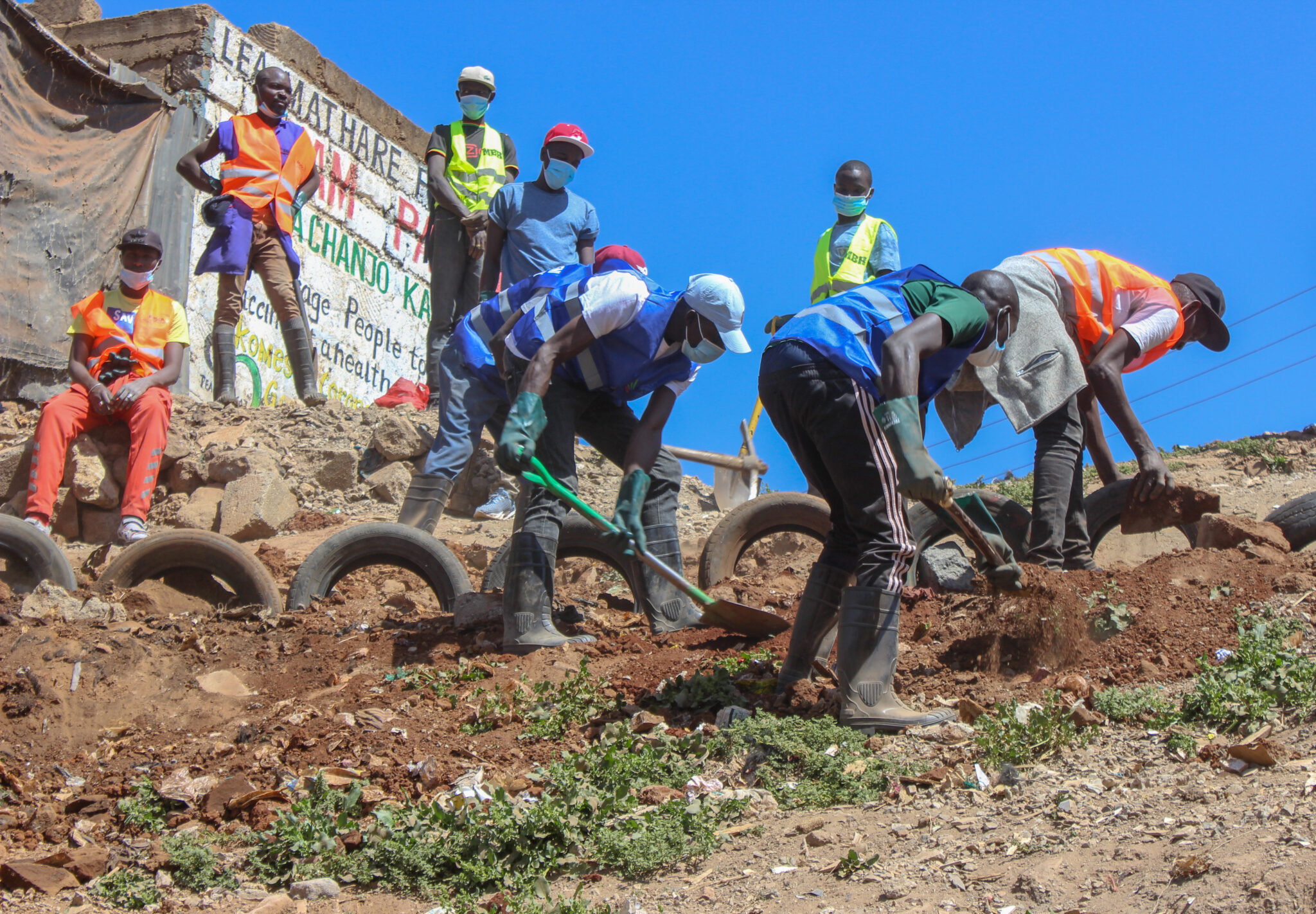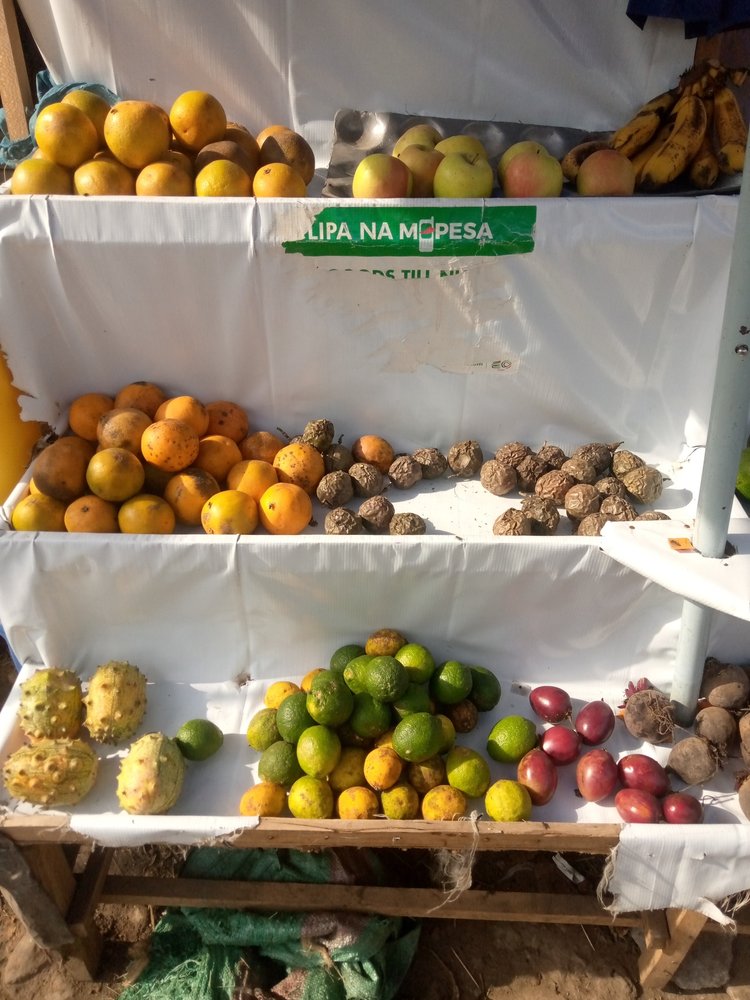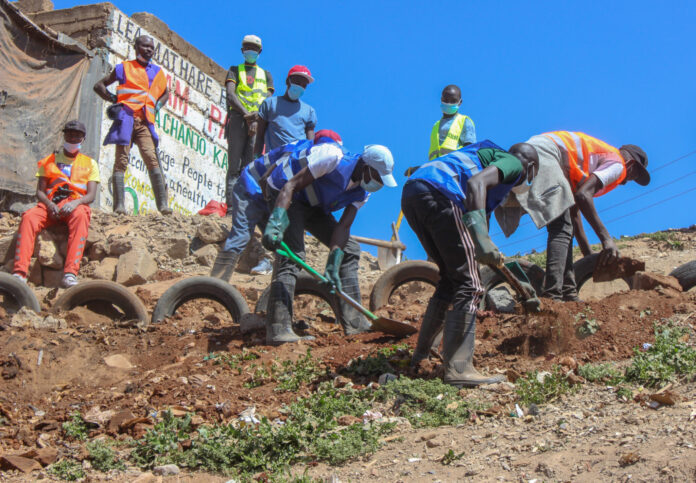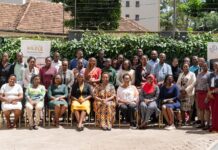By Moffin Opilio
Nairobi County, Kenya: Twenty-nine-year-old Patrick Mwangi Muchina is a family man, an entrepreneur, and a community volunteer in Mathare, an informal settlement in Nairobi.
Before the coronavirus pandemic was confirmed in Kenya in March 2020, Patrick used to earn a living for his four children through the sale of fruits and vegetables in Mathare, an informal settlement located in Kenya’s Nairobi City.
When the pandemic hit, the government introduced containment measures that affected most of Kenya’s population’s social and economic lives. Patrick was among the people that were greatly affected.
His fruit and vegetable business crumbled down mainly due to the imposed seven pm curfew, which made him work fewer hours than he was used to. Ultimately the cessation of movement between counties disrupted access to commodities and prices were rapidly hiked. His profits started decreasing daily and after one month he had to shut down and start looking for other sources of income.

Now back at home with nothing to do, Patrick began hunting for odd jobs which were also scarce at the time as many people had been laid off from work or had shut down their businesses. With four children below the age of 10 and a partner who was a stay-at-home mother, Patrick was determined to take care of his family.
He first made a decision to move to a smaller house that he could comfortably afford through the meager earnings he was getting from the day-to-day jobs. He then cut down on his daily expenses. Sometimes he and his family would survive on one meal a day and occasionally go to bed hungry on days when he couldn’t get a casual job.
Some of his peers had turned to crime as a means of survival after losing employment, prompting a sharp rise in crime in the informal settlement. But this was not an option for Patrick. His desire was to maintain his honor while feeding his family.
“I believe that our behavior should be guided solely by respect for the law, certain moral codes as well as by a sense of honor,” said Patrick.
At first, his peers’ committing crimes wasn’t a bother to him since he never had been victimized. But one evening, his family was attacked by a gang of men, who were so aggressive and ransacked his house, taking away his hard-earned house property including money that he had saved for months.
Desire for change
This scenario depressed Patrick. He felt the need for everyone, poor or rich, to have the right to feel safe and expect their homes, businesses, and properties to be secure.
Even though security officers were doing their best to contain the issue, Patrick felt compelled to do something.
He conceived the idea of running a mentorship programme aimed at empowering vulnerable youth between the ages of 17-35, who are considered at risk of being drawn into crime. With no funds to kickstart the project, he pitched the idea to a community-based organization (CBO) that focuses on empowering youths to be self-sustainable.
Patrick, together with the CBO, drafted a model plan that was used in the mentorship program and later reached out to different artisans such as carpenters, tailors, chefs, plumbers, and drivers who were tasked with teaching the youth money-making skills through apprenticeship.
Data from the CBO shows that the project started with 20 youths, who were taught hands-on skills based on individual interests. Slowly, the youths began earning money while saving a part of it.
According to security officials in the region, this program was a morale booster and within three months of being operational, change was already being experienced in the region.
“Most of these youths that would otherwise be engaged in criminal activities were now making their own money,” said Joseph Maina, the area police commander, “We have since witnessed a huge reduction in crime.”

Thirty-two-year-old Micheal Gichuki is a reformed Criminal. Two years ago, he lived on the wrong side of the law as a highway robber. He explained that he changed his mind about theft when he experienced the death of an innocent bystander who got caught in a crossfire between his gang and the police.
“I looked down on the dead body and murmured sadly, ‘What a senseless waste of human life’.”
This incident, he narrates, made him turn around and enroll in a program that would make him earn money genuinely.
He was introduced to Patrick’s programme by a neighbor who was also a part of it, and since, his life changed.
Now, Gichuki makes his money as a carpenter. “I am really impressed that my skills are appreciated by the local clients who support me by purchasing my furniture.” when 40 youths had been enrolled in the mentorship program, they joined hands to form a table banking group where they would save money while being taught financial literacy by professionals who had been contracted by the organization’s officials. This ensured that each of them was able to adequately manage finances.
Money saved through the table banking group was issued amongst themselves as loans for some to boost their own businesses.
Speaking to Jane Mugo, a mother of six children who is all enrolled in the mentorship program, she confirmed that this was one of the best ideas that happened in the informal settlement.
“You will barely find any youth idling around,” said Mugo, “most youths have an option of going to school or joining the program so as to learn basic hands-on skills.”
According to Mugo, this initiative won Patrick a lot of respect from his peers.
Three years down the line, the apprenticeship model has been recreated to ensure that every youth living in the informal settlement is accommodated in the program while keeping track of each one’s progress, even post the apprenticeship period.
“I knew that I could create an impact in the community, but I just had not imagined it would be this great,” said Patrick, “I am proud that I was able to find a way to cope with the covid-19 pandemic whilst making a great impact in the lives of those around me and the community at large.”
This publication was produced with the financial support of the European Union. Its contents are the sole responsibility of Moffin Opilio and do not necessarily reflect the views of the European Union.














